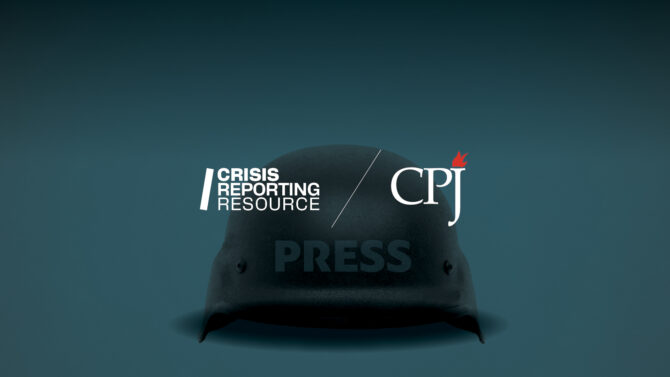This article was originally published by the Reporters Without Borders and was reproduced with permission. Any reprint permissions are subject to the original publisher.
No other 21st century war has begun in such a deadly manner for reporters. Thirty-four journalists have been killed in just two weeks, since the massacre by Hamas in Israel and the start of the bombardments of Gaza. At least 12 of them have been killed in connection with their work, most of them by Israeli strikes in Gaza.
Attacks, arrests, threats, censorship: The high risks of reporting the Israel-Hamas war

Since the Israel-Gaza conflict started on October 7, journalists and media across the region
The total of 34 journalists killed since 7 October in such a small territory is appalling. They include at least 12 reporters killed in connection with their work in the first two weeks, ten of them by Israeli bombardments in the Gaza Strip. Journalists are trapped in a 40-kilometre-long open-air prison, caught in an area that is shelled relentlessly when their offices or they themselves are not being targeted. The figures compiled by Reporters Without Borders (RSF) show the unprecedented scale of the tragedy for journalism in Gaza.
Wars are often especially deadly when they begin, but the first two weeks of this war have been the deadliest of any armed conflict in the world since the start of the 21st century.
Since 2000, we have not seen a war begin with so much violence against journalists. Israel’s attack on Gaza in response to the massacre committed by Hamas will go down in the history books and in the annals of journalism as one of the cruellest episodes for reporters, as well as for all other civilians. The Israeli government should realise that horror does not justify horror. The State of Israel will have to take responsibility before history for the deaths of journalists on a scale unknown in the 21st century. We call on the Israeli authorities to end the bombardments, which amount to war crimes. This disastrous toll adds a new blood-coloured stain to an already tragic story. More journalists have been killed in the course of their work in two weeks in the Middle East than in Ukraine since February 2022 as a result of the Russian invasion. This is the sad reality of a grim toll.
Christophe Deloire
RSF secretary-general
More reporters killed during start of war than in Iraq, Afghanistan, Yemen or Ukraine
The number of journalists killed in course of their work in the Israeli-Palestinian conflict from 7 to 23 October exceeds the total of 11 killed in connection with their work since the war began in Ukraine, seven of whom were killed during the first month after Russia launched its invasion. It also exceeds the number of reporters killed during the first 20 days of the war in Iraq in 2003, and those killed in Afghanistan in 2001, in the immediate aftermath of 9/11. From 11 to 26 November 2001, eight journalists lost their lives Afghanistan while covering the Bush administration’s “war on terror.” More recently, shortly after the outbreak of the civil war in Yemen, six journalists were killed in April and May 2015. So, in just over 15 days, the number of reporters killed in Gaza, Israel and Lebanon has broken records.
Deadliest year in Israeli-Palestinian conflict since 2000
Nine Palestinian journalists were killed in 2014, including seven in less than a month during an Israeli military operation against Gaza. But the Israeli-Palestinian conflict has now assumed an even more tragic scale. Seven journalists were killed in just 4 days, from 7 to 11 October 7. More recently, Al Shabab radio reporter Mohammed Ali was killed in a bombardment of Gaza on 20 October, while Palestine Today TV channel director Mohammad Baalouche, and photojournalist Rushdi Sarraj, a co-founder of the Ain Media press agency and fixer for many media, were killed in targeted attacks on their homes on 17 and 23 October, according to information collected by RSF.
Shockwaves from the current, exceptionally violent conflict are being felt in the rest of the region. For the first time in Israeli-Palestinian history since 2000, journalists have been killed during the same period in Lebanese, Israeli and Palestinian territory. Two journalists have also lost their lives outside Gaza: Roee Idan, an Israeli photojournalist with Ynet, killed by Hamas while filming outside his house on 7 October, and Issam Abdallah, a Lebanese journalist with the Reuters news agency, who was killed while reporting on the Lebanese-Israeli border on 13 October.
Most dangerous countries for journalists
Nearly half (45%) of the journalists killed worldwide since 2000 have been killed in seven countries at war: Iraq, Syria, Afghanistan, Somalia, Israel/Palestine and Yemen.
Iraq and Syria dominate the ranking of the most dangerous countries for the media. With a total of 582 journalists killed since 2000, these two war-torn states alone account for more than a third of the reporters killed worldwide. During the same period, 43 journalists were killed in Palestine and five in Israel, making this conflict zone the world’s fifth deadliest for the media in terms of reporters killed in connection with their work.
The dangerous nature of the profession of war reporter has been confirmed by the figures for 2023. Worldwide, the proportion of media professionals killed in war zones has increased from 32.8% in 2022 to 43.2% in the first ten months of 2023. Since the start of this year, 16 of the 37 journalists killed in connection with their work have died while covering conflict zones.
